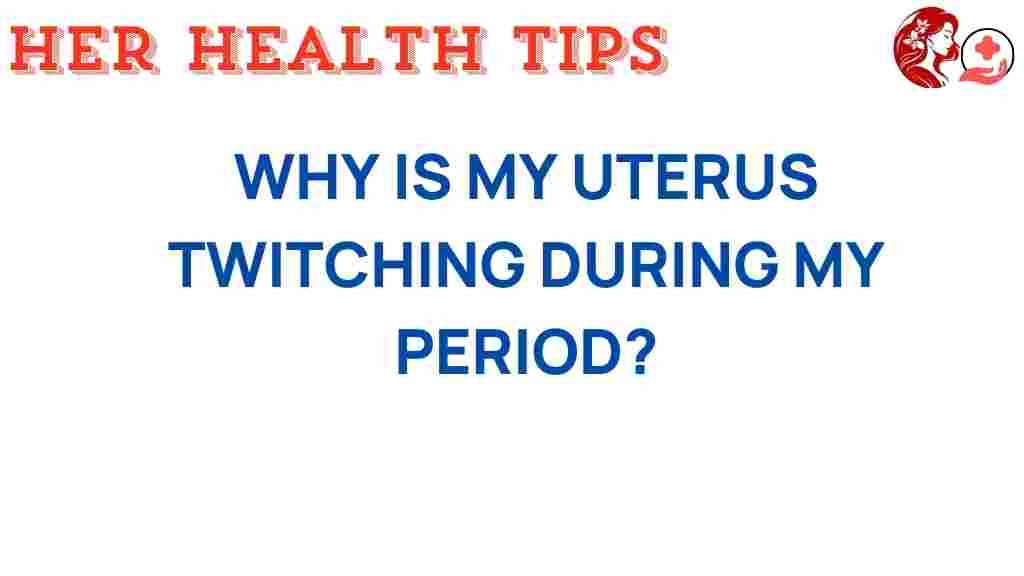Unraveling the Mystery: Why is My Uterus Twitching During My Period?
Experiencing uterus twitching during your period can be a perplexing and sometimes concerning symptom. As part of the menstrual cycle, many women encounter a variety of period symptoms that range from mild discomfort to severe pain. Understanding the causes of these sensations is crucial for maintaining good reproductive health and addressing any potential issues. In this article, we’ll delve into the reasons behind uterine twitching, the relationship to hormonal changes, and how to manage these symptoms effectively.
What is Uterus Twitching?
Uterus twitching is often described as a sudden, involuntary contraction or spasm in the uterus. This sensation can vary from mild to intense and is typically felt in the lower abdomen. During menstruation, the uterus contracts to help shed its lining, which can cause various sensations, including twitching.
Understanding the Menstrual Cycle
The menstrual cycle is a complex process regulated by hormones. It typically lasts about 28 days but can vary from 21 to 35 days in different women. The cycle can be divided into several phases:
- Menstrual Phase: The shedding of the uterine lining occurs, which is accompanied by bleeding.
- Follicular Phase: The body prepares for ovulation, and estrogen levels rise.
- Ovulation: An egg is released from the ovary.
- Luteal Phase: The body prepares for a potential pregnancy; if fertilization does not occur, the cycle restarts.
Uterus twitching is most commonly experienced during the menstrual phase when the uterus is actively contracting.
Why Does Uterus Twitching Occur During Your Period?
There are several reasons why uterus twitching may occur during your period. Understanding these can help alleviate concerns and manage symptoms better:
- Hormonal Changes: Fluctuations in hormones, particularly estrogen and progesterone, can lead to muscle contractions in the uterus.
- Cramps: The natural contractions of the uterine muscles during menstruation can result in cramps, which may also feel like twitching.
- Pelvic Discomfort: Conditions such as endometriosis or pelvic inflammatory disease can cause heightened sensitivity and unusual sensations during menstruation.
- Stress and Anxiety: Mental health can impact physical sensations. Stress can lead to muscle tension and cramping, potentially causing twitching.
Common Period Symptoms Associated with Uterus Twitching
Many women experience a range of symptoms during their menstrual cycle. Some of these include:
- Cramps: Painful contractions in the lower abdomen.
- Headaches: Hormonal fluctuations can trigger migraines or tension headaches.
- Fatigue: Hormonal changes can lead to feelings of tiredness.
- Mood Swings: Changes in hormone levels can impact emotional well-being.
- Breast Tenderness: Hormonal shifts can cause breast tissue to swell and become sensitive.
If you experience uterus twitching along with these symptoms, it may simply be a part of your body’s response to menstrual changes.
Step-by-Step: How to Manage Uterus Twitching During Your Period
Managing uterus twitching and other menstrual symptoms can greatly improve your comfort during your period. Here are some practical steps you can take:
1. Stay Hydrated
Drinking plenty of water can help reduce bloating and alleviate cramps. Aim for at least 8 glasses a day, and consider herbal teas that may soothe menstrual discomfort.
2. Heat Therapy
Applying a heating pad or hot water bottle to your abdomen can relax the muscles and reduce twitching and cramps. This is a popular and effective home remedy for many women.
3. Exercise
Gentle exercise, such as walking or yoga, can enhance blood flow and help relieve tension in the pelvic area. It can also boost your mood while reducing cramps.
4. Dietary Adjustments
Incorporating anti-inflammatory foods, such as leafy greens, nuts, and fatty fish, can help reduce period symptoms. Avoid excessive caffeine and sugar, which can exacerbate cramps and discomfort.
5. Over-the-Counter Medications
Nonsteroidal anti-inflammatory drugs (NSAIDs), such as ibuprofen, can alleviate cramps and reduce inflammation. Always consult with your healthcare provider before starting any medication.
6. Mindfulness and Relaxation Techniques
Practicing mindfulness, meditation, or deep-breathing exercises can help manage stress and anxiety, which may contribute to muscle tension and twitching.
Troubleshooting: When to Seek Medical Attention
While occasional uterus twitching is usually not a cause for concern, there are times when you should consult a healthcare professional:
- If the twitching is accompanied by severe pain that disrupts daily activities.
- If you experience abnormal bleeding or discharge.
- If symptoms persist beyond your menstrual cycle.
- If you have a known condition, such as endometriosis, and your symptoms worsen.
Consulting with a doctor can help rule out underlying conditions that may require treatment.
Understanding the Link Between Uterus Twitching and Reproductive Health
Maintaining good reproductive health is essential for all women. Regular gynecological check-ups can help monitor your menstrual cycle and any symptoms you experience. It’s important to discuss any significant changes in your cycle, including:
- Changes in the regularity of your period.
- Severe changes in symptoms.
- New or unusual sensations, such as persistent twitching.
For more information on reproductive health, consider visiting The American College of Obstetricians and Gynecologists, which provides valuable resources and guidelines.
Conclusion
Experiencing uterus twitching during your period can be an unsettling symptom, but it is often a normal part of the menstrual cycle. Understanding the causes related to hormonal changes, cramps, and pelvic discomfort can empower you to manage your symptoms effectively. By adopting self-care strategies and knowing when to seek medical advice, you can maintain your women’s health and ensure your reproductive health remains a priority. If you have any lingering menstrual questions, don’t hesitate to reach out to a healthcare provider for personalized guidance.
This article is in the category Reproductive and created by HerHealthTips Team
